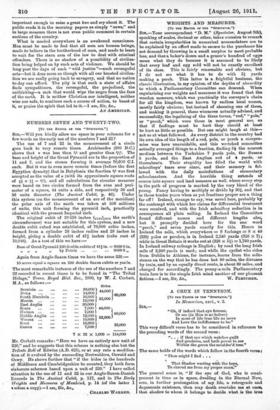WEIGHTS AND MEASURES.
[To THE EDITOR or THU "SPECTATOR.n Six,—Your correspondent "D. M." (Spectator, August 5th), speaking of scales, decimal or other, takes occasion to remark that certain irregularities in numerical nomenclature are to be explained by an effort made to secure to the purchaser his net demand by throwing in a small surplus to meet probable loss, and that a baker's dozen and a grocer's hundred of eggs mean what they do because it is assumed to be likely that every loaf and egg sold will not be exactly excellent of its class. This is fairly reasonable and obvious, but I do not see what it has to do with 51 yards making a perch. This latter is a frightful business, the classic illustration, in my opinion, of the depths of absurdity to which a Parliamentary Committee can descend. When regularizing our weights and measures it was found that the wooden measure, which was practically the surveyor's chain for all the kingdom, was known by endless local names, mostly fairly obvious; but instead of choosing one of these, and making it general, these wiseacres actually advised, and successfully, the legalizing of the three terms, "rod," " pole," or " perch," which were those in most general use, so that if feelings must be hurt they should at least be hurt as little as possible. Bnt one might laugh at this— not so at what followed. As every district in the country had its own idea of the length of a rod, pole, or perch a compro- mise was here unavoidable, and this wretched committee actually averaged things to a fraction, finding 5* the nearest medium between the Yorkshire 7 yards pole, the Sussex 5 yards, and the East Anglian rod of 4 yards, or. thereabouts. Their stupidity has filled the world with schoolboys' tears ever since, and their memory is fol- lowed with the daily maledictions of elementary schoolmasters. And the horrible thing extends of course into square and land measure as well, where every step in the path of progress is marked by the very blood of the young. Fancy having to multiply or divide by 301, and that in these tender years when as yet fractions proper are a thing far off ! Ireland, strange to say, 'was saved here, probably by the contempt with which her claims for differential treatment were received, and with the Irish schoolboy reduction is in consequence all plain sailing. In Ireland the Committee found different names and different lengths also, but it promptly decided here for the one word "perch," and seven yards exactly for this. Hence in Ireland the mile, which everywhere = 8 furlongs = 8 x 40 (320) poles or perches, is in Ireland 2,240 yards (320 X 7); while in Great Britain it works out at (320 x 5t) =1,760 yards. In Ireland railway mileage is English ; by road the long Irish mile of 2,240 yards is used; and while the cyclist who rides from Dublin to Athlone, for instance, learns from the mile- stones on the way that he has done but 60 miles, the distance by train, and by an equally direct route, is about 80 miles, and charged for accordingly. The penny-a-mile Parliamentary train fare is to the simple Irish mind another of our pleasant


































 Previous page
Previous page